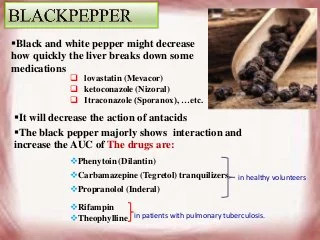Can a pregnant or breastfeeding women consume black pepper?
Black pepper interaction with Drugs

Interaction of a substance generally refers to a potential risk that could develop inside the human body when two or more drugs, products, or medical conditions, interact with one another in a negative manner that could result in certain unwanted health conditions.
Natural products such as black pepper are generally considered safe when taken in food amounts but might be harmful when consumed as a medicine amount like supplements. If an individual is medicating with certain medical drugs to treat any condition, there might be a possibility of interaction between those drugs and black pepper. This could cause complications in the condition that is to be treated or could result in new unwanted conditions.
Such interacting medical drugs include:
Antiplatelet/Anticoagulant drugs
Intake of black pepper along with drugs that resist blood clotting could increase the risk of bruising and bleeding. Drugs that decreases blood clotting includes clopidogrel (Plavix), enoxaparin (Lovenox), warfarin (Coumadin), aspirin, dalteparin (Fragmin), heparin, ticlopidine (Ticlid), and several others.
Antidiabetic Drug
Antidiabetic medicines are used to lower the blood sugar level of the body. Rosemary might also lower the sugar level. Combination of both these medical agents could increase the risk of blood sugar level getting abnormally low which could cause complications. Such antidiabetic drugs include glimepiride (Amaryl), insulin, pioglitazone (Actos), chlorpropamide (Diabinese), tolbutamide (Orinase), glyburide (DiaBeta, Glynase PresTab, Micronase), metformin (Glucophage), rosiglitazone (Avandia), glipizide (Glucotrol), and several others.
Theophylline– Consuming black pepper along with theophylline might cause more absorption of theophylline in the body than usual. This increases the risk of side effects associated with it.
Nevirapine(Viramune)– Consuming Nevirapine along with black pepper might cause more absorption of Nevirapine in the body than usual. This increases the risk of side effects associated with it.
Cyclosporine– Consuming Black pepper might increase the level of cyclosporine i th body. Therefore, the combination of black pepper along with cyclosporine might cause an increased risk of side effects associated with it.
Atorvastatin– Consuming Black pepper might increase the level of Atorvastatin in the body. Therefore, the combination of black pepper along with atorvastatin might cause an increased risk of side effects associated with it.
Carbamazepine– Consuming black pepper along with Carbamazepine might cause more absorption of Carbamazepine in the body than usual. This increases the risk of side effects associated with it.
There are also interactions of Black pepper with several other drugs such as Cytochrome P450 1A1(CYP1A1) substrates, Cytochrome P450 2D6(CYP2D6), Cytochrome P450 2B1(CYP2B1) substrates, P450 3A4(CYP3A4) substrates, etc. There could be several other medicines causing interaction with Sage in an unusual manner. It is recommended to consult a doctor or health professional to get complete information regarding rosemary and its safety with any other interacting drug.
Precautions and warnings before using Sage
Although being a natural herb that is used for a number of medical and food applications, there are certain medical conditions in a human body in which intake of Sage must be limited or avoided in order to prevent complications. Interference of this herb could result in worsening of certain medical conditions or might cause other unwanted conditions. Such medical conditions includes:
- Pregnancy- Consuming black pepper during pregnancy is likely to be considered as unsafe. It might cause irreversible conditions such as miscarriage when taken at a medicine amounts. Therefore, a pregnant woman must avoid consuming black pepper in such a condition.
- Breastfeeding- While on breastfeeding stage, a woman must avoid consuming black pepper as it is unsafe. This is concluded due to lack of information regarding its safety during breastfeeding conditions.
- Surgery– Black pepper might lower blood sugar level which might cause complications when sugar level has to be controlled during and post surgery. Also, risk of bleeding is increased when consumed in a larger amount. Therefore, it is advisable to avoid consuming black pepper at least 2 weeks before undergoing any surgery.
- Children– Black pepper is usually safe when taken in a food amount for children. However, safety for children while consuming this ingredient in larger amounts or long term use is not justified yet.
- Bleeding disorder– Black pepper has potency to decrease the formation of blood clotting. Its consumption during bleeding conditions could result in excess or abnormal bleeding than usual resulting in complications.
Side effects of using Black pepper
Interaction of black pepper with several medical drugs and no precautionary actions against several medical conditions might cause certain unusual or allergic side effects and condition in a human body that includes:

- increased risk of bleeding/bruising
- increased risk of low blood sugar level
- harm during pregnancy
- burning sensation in stomach and throat
- increases side effects of several interaction drugs
There could be more side effects not mentioned in the above list. An individual must make sure to consume black pepper with proper precaution and avoid interaction in order to prevent side effects. However if side effects are observed, it is advisable to contact a doctor or get immediate medical attention as soon as possible if necessary.
REFERENCES:
- https://www.britannica.com/plant/black-pepper-plant
- https://www.rxlist.com/black_pepper/supplements.htm
- https://www.healthline.com/nutrition/is-black-pepper-good-for-you#downsides
- https://www.medicalnewstoday.com/articles/black-pepper-benefits
- https://www.webmd.com/vitamins/ai/ingredientmono-800/black-pepper-and-white-pepper
- https://in.pinterest.com/pin/400750066836169406/
For more details, kindly visit below.